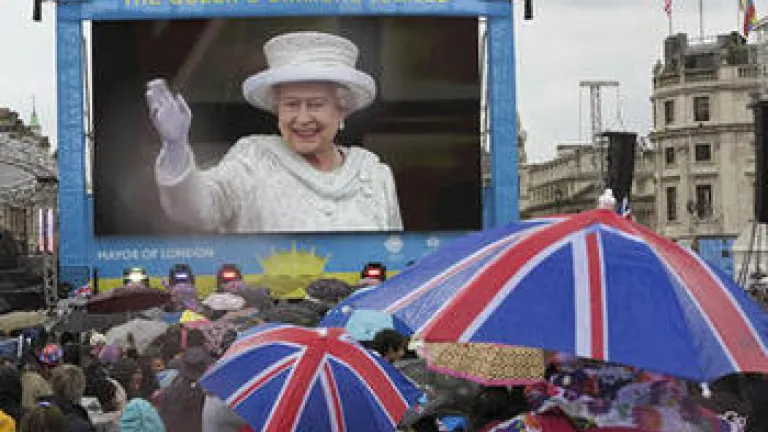Two Elizabeths A Study in Contrasts
How times have changed! Queen Elizabeth I reigned over one of Britain’s greatest periods of growth and increasing power. The reign of Queen Elizabeth II has seen the disintegration of the British Empire and the considerable decline of Britain as a military power. Why?
"Elizabeth the Great" was the banner headline sprawled across the London Daily Mail newspaper on the morning of April 21, celebrating the 80th birthday of Queen Elizabeth II.
Elizabeth the Great is also the title of a book I have in my home library. It was written in 1958 by Elizabeth Jenkins and is a biography of Elizabeth I, who reigned from 1558 to 1603.
At the time of the coronation of the present Queen Elizabeth, many people talked of a second Elizabethan Age. The Elizabethan Age was one of the greatest periods in English history, during which freedom from Rome was secured and the foundations of the future British Empire were laid.
This period was so important to the development of the Western world as we know it, that the American writer Michael H. Hart listed Elizabeth I as one of the two most influential female figures in history ( The 100: A Ranking of the Most Influential Persons in History, 1978).
Mr. Hart wrote: "Queen Elizabeth I is widely considered to have been the most outstanding monarch in English history. Her forty-five-year reign was marked by economic prosperity, a great literary flowering, and the rise of England to first rank among the world's naval powers. Living in an era when English monarchs were not mere figureheads, she is justly entitled to a significant share of the credit for the achievements of England's Golden Age" (pp. 468-9). "She left England with the world's strongest navy, and laid the foundation for the enormous British Empire which followed" (p. 473).
In stark contrast, the reign of Queen Elizabeth II has seen the disintegration of the British Empire and the considerable decline of Britain as a military power. The United Kingdom's military is now less than 25 percent of what it was at the time of the queen's ascendancy to the throne in 1952.
There is, of course, a major difference between the two queens. As noted earlier by Michael Hart, Elizabeth I lived in an era "when English monarchs were not mere figureheads." By contrast, Elizabeth II is a figurehead, a constitutional monarch, who is not personally responsible for decisions made by her governments. Nonetheless, like her earlier predecessor, she is a symbol of an age—and the age has not been a good one for the English-speaking peoples!
The importance of faith
Elizabeth I's father was King Henry VIII (1509 to 1547). It was Henry who led England away from the Roman Church. In 1537 he legalized the publication and distribution of the Bible, which had been banned by ecclesiastical authority for hundreds of years.
Only a few months earlier, the English religious reformer William Tyndale had been burned at the stake by an ecclesiastical court across the English Channel for smuggling Bibles into England. His last recorded words, while the flames and smoke rose around his body, were a prayer: "O Lord, open the eyes of the king of England."
Nine months later, that same king lifted the ban on the Scriptures, giving the people of England the opportunity to read and study the Word of God for the first time.
"By royal injunction, the Lord's Prayer and the Ten Commandments in English were to be taught sentence by sentence on Sundays and holy days throughout the year; at least one sermon on the Gospel was to be preached every quarter…and every parish church in England was to ‘set up in some convenient place' a copy of the English Bible accessible to all as ‘the very lively Word of God.' Throughout the kingdom, copies for public use and edification were soon chained to lecterns in the vestibules of churches—six of them in St. Paul's church alone" (Benson Bobrick, Wide as the Waters, 2001, p. 151).
An early biography of Thomas Cranmer, archbishop of Canterbury at the time of this momentous event, who was later burned at the stake under the Catholic Queen Mary, observed:
"It was wonderful to see with what joy the book of God was received, not only among the learned sort…but generally all England over among all the vulgar and common people; with what greediness God's word was read, and what resort to places where the reading of it was. Everybody that could bought the book and busily read it, or got others to read it to them, if they could not themselves; and divers among the elderly learned to read on purpose. And even little boys flocked among the rest to hear portions of the Holy Scriptures read" (ibid., pp. 151-152).
When did all this change? French Canadian historian Jacques Barzun wrote: "It did not cease for 350 years: 1900 was the first year in which religious works (at least in England) did not outnumber all other publications" (From Dawn to Decadence, 2000, p. 10).
The title of Mr. Barzun's book is itself revelatory. The dawn of our present Anglo-American civilization was the Protestant Reformation. The decadence referred to in the title is the present era, decadence being defined as the rejection of all the values upon which our civilization was built. The rejection of those values has been the hallmark of the second Elizabethan era.
While the queen herself is reputedly a very religious woman, most of her subjects today are not. During the reign of the first Elizabeth, there was an incredible enthusiasm for the Bible as the "very Word of God." The reign of the present Queen Elizabeth sees instead almost universal ignorance and rejection of the Bible, resulting in a people living in spiritual darkness!
Britain's rise to greatness coincided with the country's enthusiasm for the Word of God. "Only in England was the Bible in any sense a national possession… Englishmen carried their Bible with them—as the rock and foundation of their lives—overseas… Beyond the shores of Albion it fortified the spirit of the pioneers of New England, helped to shape the American psyche, and through its impact on thought and culture eventually spread the world over" ( Wide as the Waters, p. 12).
It can also be said that Britain's decline from greatness coincided with its rejection of the Word of God in education, popular culture and even in organized religion. Today, America is also traveling down that same path!
The Old Testament book of Deuteronomy helps us understand this. In chapter 28 God promised blessings to the descendants of Israel for obedience to His laws. Later in the chapter, He says that disobedience would result in penalties.
Verse 1 introduces the blessings, "Now it shall come to pass, if you diligently obey the voice of the LORD your God, to observe carefully all His commandments which I command you today, that the LORD your God will set you high above all nations of the earth."
The Bible and history show that the British people fulfilled the promise made to Joseph's sons of becoming "a multitude of nations" (Genesis 48:19). (For more on this, see our booklet The United States and Britain in Bible Prophecy.)
Part of God's blessing was the wide distribution of the Bible. The enthusiasm for the Word of God lasted right up until the end of the Victorian Era—although its authority began to be challenged because of Charles Darwin's theory of evolution, published in 1859 in his book, The Origin of Species. After Queen Victoria's reign, many of the British peoples turned further away from God.
"But it shall come to pass, if you do not obey the voice of the LORD your God, to observe carefully all His commandments and His statutes which I command you today, that all these curses will come upon you and overtake you" (Deuteronomy 28:15).
The blessing promised to Ephraim was the multitude of nations, the Empire and Commonwealth of which the British monarch was the symbolic head. It was this group of nations that fought together through two world wars and countless other smaller conflicts, resisting tyranny and bonding together as "an association of free peoples."
Sir Winston Churchill, the queen's favorite prime minister, understood its importance, but the British politicians and people after World War II chose to turn their backs on it.
Decadence and decline
My wife and I were in Cape Town, South Africa, watching the celebrations of the queen's 80th birthday on the three main news channels delivered by satellite around the world: BBC World, Sky News and CNN International, none of which is available in the United States. It was in Johannesburg, South Africa, 59 years earlier, on her 21st birthday, that then Princess Elizabeth broadcast to the peoples of the Commonwealth and pledged her life "to the service of the great imperial family to which we all belong."
At her coronation six years later, she was crowned queen of the United Kingdom, Australia, Canada, New Zealand, the Union of South Africa, Pakistan, Ceylon (all fully independent nations), "and her other realms and territories" (the various colonies and protectorates that were ruled from London).
It is doubtful that anybody on that day could have foreseen the dismantling of that same "imperial family," but in the lifetime of one monarch, it's all gone. The Commonwealth remains, but is now a loose affiliation of fully independent nations with no military and few economic ties.
The British government today concentrates on Europe, having diverted its attention from the Commonwealth, which is a reminder of the "politically incorrect" colonial days. Because the queen herself is still on the throne, few people realize the significance of the change that has taken place during her reign.
Only the queen herself continues to care about the organization, visiting its 54 member nations in her role as head of the Commonwealth. After she is gone, we cannot tell how much longer the Commonwealth will last.
Not once on the occasion of her birthday was the Commonwealth even mentioned. Her son and heir Prince Charles spoke only to the British people on television toward the end of the day, while not one of the television stations covering the event mentioned the Commonwealth or reflected on Britain's greatly diminished role at this point in her reign.
It was as if the "multitude of nations" never existed!
The Empire and Commonwealth of the first Elizabeth's reign was the glory of Britain, the prophesied strength promised to Joseph's son, Ephraim. The multitude of nations that God gave to Great Britain stood at her side in countless conflicts, as she stood with them.
For four centuries, Britain concentrated on her relationships with her overseas possessions, of which she was the undisputed leader. Now, under the present Elizabeth's reign, the emphasis is on Europe and the nation's commitment is to an uncertain future within a European superstate where Britain is just another member. WNP






